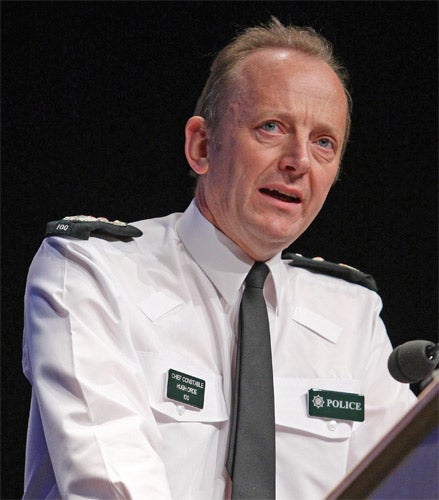Murder squads may be abolished to keep police on the streets

Specialist police units dedicated to investigating crimes such as murder, rape or child abduction could be abolished because of the cutbacks in Whitehall, a senior officer warned yesterday.
Sir Hugh Orde, president of the Association of Chief Police Officers (ACPO) and a former chief constable of Northern Ireland, warned that teams dealing with one specific type of crime could be merged or scrapped as officers were moved elsewhere.
His comments came after the Home Secretary, Theresa May, said that she expected the number of police on the streets to rise despite the budget cuts. Individual forces would have to make "tough decisions", she admitted, but she suggested they could save money by working together to buy uniforms, vehicles and computer systems.
However, Sir Hugh warned that the cuts were more likely to come at the expense of specialist officers. "The harsh reality is that the gold standard in some of the specialisms will have to be reduced," he said. "Chief constables have to make a hard choice; they will want to maintain levels of neighbourhood police and try to make savings out of specialist units.
"If I was [a chief constable] I would look at mainstreaming some of the things which are now specialist units. I wouldn't be surprised to see a smaller number of specialist units. The risk to that is people saying you could do better, but the response is 'we do not have the numbers'.
"The public will criticise us and we understand that, but we have not got the numbers. If you haven't got the numbers, something has to give.
It is highly possible we will have a more generic response to crime investigations; we could have a serious crime unit rather than rape, murder and abduction units. You have got to make the best fit without the numbers – more generalism, less specialism, economies of scale."
In her address to the ACPO annual conference in Manchester, Ms May said she was scrapping the current system whereby the achievement of a police force is ranked according to how well the public thinks it is performing. In future, police will be assessed solely on their ability to reduce crime.
The existence of the "customer satisfaction target" – with its minimum requirement of 60 per cent – had led to claims that officers were being forced to concentrate on proving they were reducing crime, rather than focusing on actually doing so.
Ms May said she would scrap the "policing pledge" – a 10-point "mission statement" which includes such vows to the public as "we will always treat you fairly, with dignity and respect" – and introduce public elections for police commissioners within two years.
The Home Secretary said: "Targets don't fight crime; targets hinder the fight against crime. In scrapping the confidence target and the policing pledge, I couldn't be any clearer about your mission: it isn't a 30-point plan; it is to cut crime. No more and no less."
Sir Hugh said the suggestion that forces could be judged purely on their ability to cut crime was "oversimplistic". He said officers also had a responsibility to "preserve life", pointing out that although attendance at a car crash or searching for a missing person would not lower offending rates, these were vital police functions.
